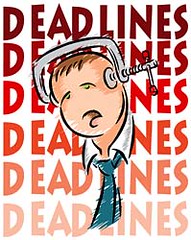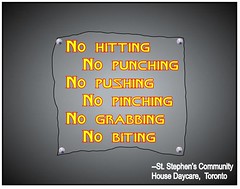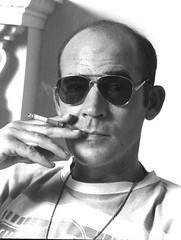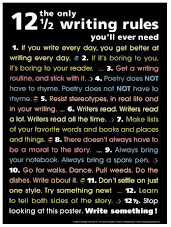SACRAMENTO, Calif., USA - The Sacramento Bee's television critic, Rick Kushman, kept the CSU, Sacramento column-writing class laughing for a good part of his hour-long presentation/conversation Tuesday night.
At one point, he boosted his credibility tremendously by pointing out that he once was on the receiving end of a kiss from Tina Fey.
Yes, that Tina Fey, the actress who does an impression of Alaska Gov. Sarah Palin that is better than Sarah Palin can do of herself.
Rick has started a new column in The Bee - added to his other duties covering television. He detailed out some of the pitfalls of starting the column "The Good Life" from scratch - a column that "still evolving," he said.
Rick didn't encourage anyone to leap into the world of print media, but he was encouraging for anyone who wants to write and be published in whatever media environment develops.
"It's all about good-writing - all good writing."
Tuesday, September 30, 2008
Sunday, September 28, 2008
The Hot Zone and Richard Preston in Literary Journalism
SACRAMENTO, Calif., USA - The Literary Journalism class at CSU, Sacramento will be discussing Richard Preston's book, The Hot Zone, again Monday night after going through parts of the tome last week.
The Hot Zone is about the Ebola virus, sort of. It's also about the potential of the disease, human reactions and how close the world might have come to disaster.
It also ponders the question: Will the world face Ebola again?
And when.
Preston, a writer for The New Yorker magazine has written three books about viruses: The Hot Zone, The Cobra Event, and The Demon in the Freezer. But branched out with a recent book, called The Wild Trees about giant redwoods and sequoias. Sorry about that 'branched-out' pun.
The Cobra Event was fictional, but was so well-researched - and written - that it prompted President Bill Clinton to spend many millions of dollars to get the nation ready for the bio-terror scenario that Preston suggests could happen.
Preston was interviewed last year by Jon Stewart for the Daily Show. And like all Jon Stewart interviews, well worth watching.
The Hot Zone is about the Ebola virus, sort of. It's also about the potential of the disease, human reactions and how close the world might have come to disaster.
It also ponders the question: Will the world face Ebola again?
And when.
Preston, a writer for The New Yorker magazine has written three books about viruses: The Hot Zone, The Cobra Event, and The Demon in the Freezer. But branched out with a recent book, called The Wild Trees about giant redwoods and sequoias. Sorry about that 'branched-out' pun.
The Cobra Event was fictional, but was so well-researched - and written - that it prompted President Bill Clinton to spend many millions of dollars to get the nation ready for the bio-terror scenario that Preston suggests could happen.
Preston was interviewed last year by Jon Stewart for the Daily Show. And like all Jon Stewart interviews, well worth watching.
Labels:
Jon Stewart,
Richard Preston,
The Hot Zone
Thursday, September 18, 2008
Column-writing assignment on the mysterious Natalie Dylan
SACRAMENTO, Calif., USA - The column writing class this week is writing about Natalie Dylan, a woman who supposedly graduated from CSU, Sacramento with a degree in Women's Studies.
Why is she worth writing about?
She is involved in an auction of her virginity - a very public auction that has involved Howard Stern and many major news organizations in the U.S. and abroad have picked up the story and featured it quite prominently.
Yes, it's true. I can't make this stuff up. Who would believe it?

"Natalie"

'Natalie' on the right, her sister is on the left
The column writers' directions are simple: attack this column topic from any angle they want: rage, support, bewilderment...
There are so many different angles that the writers are mostly likely to be bewildered by how to even start.
Were I to use Ms. Dylan (which is not her real name, by the way) as a topic for a column, I think I would take a look at what could be a fairly elaborate hoax.
Hoax?
Well, it seems that the woman, who says she is 22-years-old, claims that she is a fairly recent graduate of CSU, Sacramento and says she is supposed to begin her graduate studies in January - graduate studies in marriage and family counseling.
Confirming any of all this seems to be beyond the abilities of all local (and even national) media.
As I said, I can't make this stuff up.
Why is she worth writing about?
She is involved in an auction of her virginity - a very public auction that has involved Howard Stern and many major news organizations in the U.S. and abroad have picked up the story and featured it quite prominently.
Yes, it's true. I can't make this stuff up. Who would believe it?

"Natalie"

'Natalie' on the right, her sister is on the left
The column writers' directions are simple: attack this column topic from any angle they want: rage, support, bewilderment...
There are so many different angles that the writers are mostly likely to be bewildered by how to even start.
Were I to use Ms. Dylan (which is not her real name, by the way) as a topic for a column, I think I would take a look at what could be a fairly elaborate hoax.
Hoax?
Well, it seems that the woman, who says she is 22-years-old, claims that she is a fairly recent graduate of CSU, Sacramento and says she is supposed to begin her graduate studies in January - graduate studies in marriage and family counseling.
Confirming any of all this seems to be beyond the abilities of all local (and even national) media.
As I said, I can't make this stuff up.
Saturday, September 13, 2008
Deadlines and deadlines: Why making them is important
SACRAMENTO, Calif., USA - The beginning of every semester brings a new crop of students, many of whom have never faced the absolute deadlines that exist in most journalistic writing.
Whether it is something as simple as sending me an email (so I can create an email list for the class) or turning in a column or other piece of writing, there are always a few students who don't make the deadline.
And then there is always the argument that the deadline is arbitrary and not grounded in any real need.
Sigh.

My first newspaper job was at the Napa Register, in the circulation department where I pulled stacks of paper off the press and got them ready for delivery to the paper carriers all over Napa and Solano County. The press was supposed to start at 1 p.m. Not 12:59 (though going early would have been ok), but 1 p.m.
If the press was more than a minute or two starting up, the phone in the press room would start ringing and within 10 minutes or so, all the department heads in the building involved in the production of the newspaper would be in the publisher's office, getting their asses chewed - quite thoroughly - by publisher J.V. Brenner as he would try to figure out where the fault was.
When I moved into the newsroom a year later, as a novice reporter, I found out that if I was five minutes late with a story, it would likely result in my editor being late in what he turned into the composing room which in turn meant composing would be late to the plate-making department (for the press) and so on.
A story that was five minutes late could cause a domino effect that could make the presses a half-hour late.
I never missed a deadline there.
At the Sacramento Bee, when I worked as fill-in editor for the Forum section, the pages were to be sent electronically to composing by 5 p.m. on Thursdays. And if they didn't show up in the queue by 5:01, the phone would start ringing in then-editor Bill Moore's office where I worked, the secretary would come bustling in with a message from downstairs and within a few minutes after than, the big boss, Howard Weaver, was likely to start asking me 'What-the-hell-is-goin'-on?'
There are reasons, of course, why sometimes things don't get written - and turned in - on time.
Sickness, computer malfunctions, balky sources and plain old writer's block can all push the writer past that magic time.
None of them (except perhaps sickness) ever gets the writer any slack from an editor. Deadlines are deadlines - including showing up on time.
At the Petaluma Argus-Courier, we had one writer who was 15 minutes late arriving at work every morning. You could, as the expression goes, set your watch by his arrival.
When I became his editor after about a year, I asked him why he was routinely late every morning. He said he just didn't know. He left in what he thought was plenty of time - even driving faster than the speed limit most of the way from San Rafael to Petaluma.
But he was always 15 minutes late.
I suggested another strategy that he had apparently never thought of: leave his house 15 minutes earlier every morning.
You can guess what happened when he did start leaving his house earlier.
When I have a piece of writing to do - any writing - I estimate how long it will take me to get it done, and then I double the estimate, starting waaaaay earlier than I think I need to.
That system works well enough that I haven't missed a deadline since, well, I can't remember ever missing a deadline for turning in a story to magazine, newspaper, or web-based publication.
That day might come, I suppose, but for now I have to close off this blog entry. I gave myself an 11:50 deadline to get this done.
And I don't want to be late.
Whether it is something as simple as sending me an email (so I can create an email list for the class) or turning in a column or other piece of writing, there are always a few students who don't make the deadline.
And then there is always the argument that the deadline is arbitrary and not grounded in any real need.
Sigh.

My first newspaper job was at the Napa Register, in the circulation department where I pulled stacks of paper off the press and got them ready for delivery to the paper carriers all over Napa and Solano County. The press was supposed to start at 1 p.m. Not 12:59 (though going early would have been ok), but 1 p.m.
If the press was more than a minute or two starting up, the phone in the press room would start ringing and within 10 minutes or so, all the department heads in the building involved in the production of the newspaper would be in the publisher's office, getting their asses chewed - quite thoroughly - by publisher J.V. Brenner as he would try to figure out where the fault was.
When I moved into the newsroom a year later, as a novice reporter, I found out that if I was five minutes late with a story, it would likely result in my editor being late in what he turned into the composing room which in turn meant composing would be late to the plate-making department (for the press) and so on.
A story that was five minutes late could cause a domino effect that could make the presses a half-hour late.
I never missed a deadline there.
At the Sacramento Bee, when I worked as fill-in editor for the Forum section, the pages were to be sent electronically to composing by 5 p.m. on Thursdays. And if they didn't show up in the queue by 5:01, the phone would start ringing in then-editor Bill Moore's office where I worked, the secretary would come bustling in with a message from downstairs and within a few minutes after than, the big boss, Howard Weaver, was likely to start asking me 'What-the-hell-is-goin'-on?'
There are reasons, of course, why sometimes things don't get written - and turned in - on time.
Sickness, computer malfunctions, balky sources and plain old writer's block can all push the writer past that magic time.
None of them (except perhaps sickness) ever gets the writer any slack from an editor. Deadlines are deadlines - including showing up on time.
At the Petaluma Argus-Courier, we had one writer who was 15 minutes late arriving at work every morning. You could, as the expression goes, set your watch by his arrival.
When I became his editor after about a year, I asked him why he was routinely late every morning. He said he just didn't know. He left in what he thought was plenty of time - even driving faster than the speed limit most of the way from San Rafael to Petaluma.
But he was always 15 minutes late.
I suggested another strategy that he had apparently never thought of: leave his house 15 minutes earlier every morning.
You can guess what happened when he did start leaving his house earlier.
When I have a piece of writing to do - any writing - I estimate how long it will take me to get it done, and then I double the estimate, starting waaaaay earlier than I think I need to.
That system works well enough that I haven't missed a deadline since, well, I can't remember ever missing a deadline for turning in a story to magazine, newspaper, or web-based publication.
That day might come, I suppose, but for now I have to close off this blog entry. I gave myself an 11:50 deadline to get this done.
And I don't want to be late.
Labels:
deadlines,
journalism students,
websites
Thursday, September 11, 2008
Column writers tackle rules that make no sense
SACRAMENTO, Calif., USA - My assignment to the column writers this week was to craft a column around the idea of rules - rules that seem nonsensical or weird or maybe even that do the opposite of what they were intended to do.
Of course, it is also possible to write about rules for which their reason for existing has evaporated into the mists of the past.
You don't have to think too hard to come up with those.
One strict rule I remember from growing up was that if I ate anything - a single potato chip - I was not allowed to go swimming for 45 minutes. Why? Well, because if I did, I would absolutely get a cramp and sink like a stone. At least that's what my mother and and grandmother and aunts and uncles said - and enforced on me and my cousins.
Since then, I found that the time varied greatly among people and their families. Some parents told their kids it was an hour, others a half-hour. When I became lifeguard in college, I discovered that the whole concept was mostly bull**it. You would have to eat a double-cheese burger and wash it down with a Big Gulp before there's a chance (a chance!) of any cramping.
More likely even in that case, you would only cut loose with a burp that could knock a sleeping lifeguard right off their chair.
That said, I did once have to swim out to rescue a soldier on leave who got a stomach cramp and did sink like a stone into 15 feet of water. But he hadn't had anything to eat or drink for several hours.
Rules, rules, rules. I should get to read some very interesting columns Friday morning.

Of course, it is also possible to write about rules for which their reason for existing has evaporated into the mists of the past.
You don't have to think too hard to come up with those.
One strict rule I remember from growing up was that if I ate anything - a single potato chip - I was not allowed to go swimming for 45 minutes. Why? Well, because if I did, I would absolutely get a cramp and sink like a stone. At least that's what my mother and and grandmother and aunts and uncles said - and enforced on me and my cousins.
Since then, I found that the time varied greatly among people and their families. Some parents told their kids it was an hour, others a half-hour. When I became lifeguard in college, I discovered that the whole concept was mostly bull**it. You would have to eat a double-cheese burger and wash it down with a Big Gulp before there's a chance (a chance!) of any cramping.
More likely even in that case, you would only cut loose with a burp that could knock a sleeping lifeguard right off their chair.
That said, I did once have to swim out to rescue a soldier on leave who got a stomach cramp and did sink like a stone into 15 feet of water. But he hadn't had anything to eat or drink for several hours.
Rules, rules, rules. I should get to read some very interesting columns Friday morning.

Monday, September 08, 2008
Back to the twin pursuits of columns and literary journalism
CALIFORNIA STATE UNIVERSITY, Sacramento, Sacramento, CA USA - With two heavy duty writing classes on my schedule this semester - Literary Journalism and Column Writing - it would seem that I should get inspired to get back to my own writing.
Perhaps.
Moving into a new house, after flying 2,500 miles to get here, took most of the writing starch out of me with this missive being the first writing since leaving Valois, New York more than a week ago.
Que lastima.
But these two classes (and two basic news writing courses) almost always provide a kind of weird kinetic vibration that gets me writing again after short respites.
In Literary Journalism, we will be reading the works of Sebastian Junger, Hunter S. Thompson, Jon Krakauer and a half dozen others. The students will also be producing a draft of a major piece of Literary Journalism, after a semester of research.

Hunter S. Thompson
In column writing, students will be producing two 650-word columns per week - an admittedly heavy load - except that the work is, well, the work of writing and by the end of the semester they should be, for the most part, facil writers who can bang out a column.
And me? I'll be reading a lot of student work, but also getting back to work on my fiction (Soundtrack, a novel that has been in progress for five years) and beginning a work of literary journalism about immigration. I say beginning because my best sources are in Mexico, a few houses from where I will be living this winter and spring.
And, time permitting, I'll be back using this column to talk about making money with writing.
Time permitting.


Perhaps.
Moving into a new house, after flying 2,500 miles to get here, took most of the writing starch out of me with this missive being the first writing since leaving Valois, New York more than a week ago.
Que lastima.
But these two classes (and two basic news writing courses) almost always provide a kind of weird kinetic vibration that gets me writing again after short respites.
In Literary Journalism, we will be reading the works of Sebastian Junger, Hunter S. Thompson, Jon Krakauer and a half dozen others. The students will also be producing a draft of a major piece of Literary Journalism, after a semester of research.

Hunter S. Thompson
In column writing, students will be producing two 650-word columns per week - an admittedly heavy load - except that the work is, well, the work of writing and by the end of the semester they should be, for the most part, facil writers who can bang out a column.
And me? I'll be reading a lot of student work, but also getting back to work on my fiction (Soundtrack, a novel that has been in progress for five years) and beginning a work of literary journalism about immigration. I say beginning because my best sources are in Mexico, a few houses from where I will be living this winter and spring.
And, time permitting, I'll be back using this column to talk about making money with writing.
Time permitting.


Labels:
column writing,
columns,
Literary Journalism
Subscribe to:
Comments (Atom)














